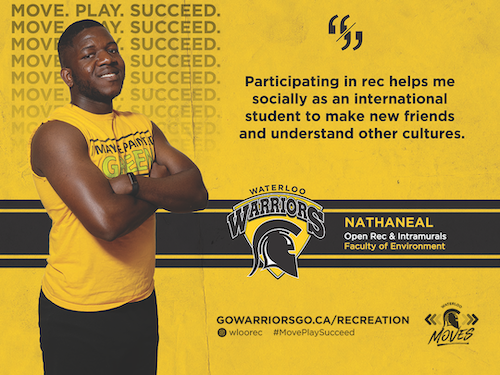Editor:
Brandon Sweet
University Communications
bulletin@uwaterloo.ca
Promoting wellness through active living, even while remote

A message from Campus Wellness.
However you choose to move, the most important part is that you do. We spoke with Robbyn Hesch, Donna Rheams and Adam Steeves from the Department of Athletics and Recreation about the importance of active living and the wellness initiatives they’re leading.
Highlighting the benefits of being active and creating unique opportunities for individuals to move are just some of the ways they are demonstrating their commitment to wellness. The average university student spends approximately 12 hours a day sedentary.And this number may have increased, considering many of us spend our days in one location. By encouraging our campus community to take a break to do something they enjoy, their hope is that active living becomes a sustainable part of daily life.
The department has been diversifying existing programs and activities, integrating new ones, and fostering fun environments in the hopes that they can provide something that meets the interests of everyone. Even during these uncertain times, the department is promoting Healthy Warriors at Home, and offering Online Warrior Workouts throughout Spring 2020 term, as well as virtual personal training, Warrior health webinars, nutrition tips, intramural e-sports and more. For students unsure where to start, Move Your Mind offersindividualized peer support to help overcome barriers to physical activity. This innovative approach provides opportunities for everyone at UWaterloo to stay active, while fostering a sense of community and connection during a time of physical distancing.
As we return to campus, you will find posters in 30 buildings across main campus featuring student participants from every faculty. This campaign aims to showcase the diversity of participants and programming in campus recreation and the many benefits of involvement. These poster boards help to promote a culture of active living at University of Waterloo. This same culture of active living can be found on the department’s Facebook (@waterloowarriors) and Instagram (@wloorec), and features everything from at home workout plans, personal stories from students, meal ideas, volunteer opportunities and more.
Finding a way to take care of our mental and physical health may look a bit different right now and the Athletics and Recreation department is here to support you with a myriad of opportunities. You can check out their website to find up-to-date information about how their services evolve throughout the university’s response to COVID-19, or connect with a member of the recreation team to help you get started.
Celebrate National AccessAbility Week

A message from Human Resources.
May 31 to June 6, 2020 is National AccessAbility Week – a week dedicated to inclusion and accessibility in Canada. Waterloo is committed to achieving barrier free accessibility for persons with disabilities studying, visiting and/or working at Waterloo. Visit our Accessibility at Waterloo website to find out what Waterloo is doing to serve our community accessibly, as well as resources on how you can deliver accessible service to our community. Be sure to send any accessibility feedback you may have through the feedback form, or contacting one of the Accessibility Committee members, including any accessibility success stories that you think should be featured in our next Multi-Year Accessibility Plan Progress Report.
A simple and important step we can all do to help create a culture of inclusion is to take the Employee Accessibility Training to understand Waterloo’s commitment to accessibility, and learn about resources and tools on delivering accessible service. It’s also mandatory under the Accessibility for Ontarians with Disabilities Act (AODA). Have you taken your training yet?
Q and A with the experts: is working from home possible for everyone?

The University of Waterloo has a number of experts available for comment on various aspects of the COVID-19 pandemic.
Twitter, Facebook, Shopify – these are just a few examples of large companies that have indicated that even after the pandemic, their employees will continue to work from home.
But is working from home good for everyone, and every company?
Ellen MacEachen is a founder of the Centre for Research on Work Disability Policy and an expert in how work adapts to fast-changing economic, social, and technological environments. Professor MacEachen answers our questions here.
What does working from home mean for those with disabilities? Does it make working easier?
For some people with physical disabilities, WFH levels the playing field. That is, because they are working at a distance, people who can’t simply hop on a bus or climb the front steps of a building now don’t need to navigate complex travel arrangements to get from A to B. Stigma often surrounds visible disabilities and so, depending on the nature of the condition, this might be reduced when a person is viewed only through a camera angle. WFH can provide more flexible working hours and this might work in the favour of people with pain conditions, allowing them to take a break when needed. Indeed, people with disabilities are disproportionately self-employed largely due to the control this gives them over their own schedule, which they need in order to manage their health conditions.
Mental health is another issue. The lack of social contact and isolation time can exacerbate some conditions.
Does working from home mean that employees are less engaged in the jobs?
Not necessarily. Managers will have to oversee workers in different ways when they work from home. WFH has, until now, been mainly the purview of artists and knowledge workers. For these groups, with project- and deadline-based work, productivity won’t be very affected whether or not people WFH. For other types of work, managerial oversight will have to be different than in-person meetings. For instance, managers might have daily morning video-meetings with the team so that they can all touch base and go over coordination of issues and targets for the day.
Is working from home sustainable for the long term? Can non-tech companies manage it?
Yes. I see us making a swing toward WFH across sectors. This will be particularly attractive to employers as a cost-saving approach (no more buildings to rent). It will also be attractive to many workers, seeming to offer a new level of freedom and eliminating commute times. However, WFH may not work for everyone. Consider lower income-earners who don’t have resources or space to have a good office set-up. Consider people in small apartments with family around, or people who have to work from the kitchen table, or people who live in areas with poor Wi-Fi connectivity.
Ellen MacEachen is an associate professor and associate director, graduate research programs in the School of Public Health and Health Systems.
Here are a few more Good Buddies of the University

"This is my favourite little coworker Bella," writes Karen Schooley, grad coordinator in Mechanical and Mechatronics Engineering. "She is a 3 year old ShiZhu. She patiently waits in her favourite spot in the sunshine till we head out for our lunchtime walk."

"Here's a photo of my hard-working cat Jadzia," writes Joe Petrik, communications officer in the Cheriton School of Computer Science.
Remember, you can continue to submit photos of your Good Buddies to bulletin@uwaterloo.ca.
Link of the day
The last American receiving a Civil War pension has died
When and Where to get support
Students can visit the Student Success Office online for supports including academic development, international student resources, leadership development, exchange and study abroad, and opportunities to get involved.
Award from GSEF-GSA-GSPA for thesis-based master’s and PhD students who have lost funding because of COVID-19. Visit https://uwaterloo.ca/gspa/covid-19-updates-graduate-students for more details.
Instructors can visit the Keep Learning website to get support on adapting their teaching and learning plans for an online environment. The following workshops are current offerings from the KL team (CTE, CEL, ITMS, LIB):
Teaching Online: Basic Skills for TAs, June 1 to 30.
Teaching Online: Advanced Skills for TAs, June 1 to 30.
LEARN for TAs (CTE6550), Thursday, June 4, 1:00 p.m.
Deepening Your Course Design: Remote Edition, Monday, June 15, 1:30 p.m.
Google Translate – a tool for cheating or a tool for learning?Wednesday, June 17, 2:00 p.m.
Employees can access resources to help them work remotely, including managing University records and privacy of personal information
Interested in learning more about engaging your students in an online course? The Centre for Extended Learning has created a new resource for you called "Fostering Engagement: Facilitating Online Courses in Higher Education"
ThisOpen Educational Resource was designed for post-secondary instructors and teaching assistants who would like to better understand the critical role of facilitation in online course delivery, and build practical skills and strategies that are relevant, effective, and authentic.
Here are some tips for staying healthy while working from home.
The Writing and Communication Centre has gone virtual to provide assistance.
Grad Writing Cafés and #WaterlooWrites, self-registration on LEARN:
- Tuesdays: 9:00 a.m. to 12:00 p.m.
- Wednesdays: 2:00 p.m. to 4:30 p.m.
- Fridays: 9:00 a.m. to 12:00 p.m.
Virtual Drop-In Appointments, Tuesday, May 19 to Thursday, August 6, registration on WCONLINE
- Sunday - Thursday from 6:00 to 9:00 p.m.
- Sign up begins at 5:55 p.m.
- Closed for the holidays on July 1 and August 3
- Appointments are 25 minutes long
We understand that these circumstances can be troubling, and you may need to speak with someone for emotional support. Good2Talk is a post-secondary student helpline based in Ontario, Canada that is available to all students.
If you feel overwhelmed or anxious and need to talk to somebody, please contact the University’s Campus Wellness services, either Health Services or Counselling Services.
The Library has published a resource guide on how to avoid information overload.
The Faculty Association of the University of Waterloo (FAUW)continues to advocate for its members. Check out the FAUW blogfor more information.
The University of Waterloo Staff Association (UWSA) continues to advocate for its members. Check out the UWSA blog for more information.
WUSA supports for students:
Food Support Service food hampers are currently available from the Turnkey Desk on weekdays from 9:00 a.m. to 4:00 p.m. in the Student Life Centre. If you have any questions please email us at foodsupport@wusa.ca.
MATES – Providing general online Peer Support via Skype to undergraduate students. To set up an appointment, please contact mates@wusa.ca
Empower Me is a confidential mental health and wellness service that connects students with qualified counsellors 24/7. They can be reached at 1-844-741-6389.
Glow Centre - Providing online Peer Support for the LGBTQ2+ community via Skype to Undergraduate students. To set up an appointment, please contact glow@wusa.ca
The Women’s Centre – Providing online Peer Support via Skype to undergraduate students. To set up an appointment, please contact womenscentre@wusa.ca
RAISE – Providing online Peer Support via Skype to undergraduate students. To set up an appointment, please contact raise@wusa.ca.
Centre for Academic Policy Support - CAPS is here to assist Waterloo undergraduates throughout their experience in navigating academic policy in the instances of filing petitions, grievances and appeals. Please contact them at caps@wusa.ca . More information at http://wusa.ca/caps
WUSA Commissioners who can help in a variety of areas that students may be experiencing during this time:
- Equity – equity@wusa.ca
- Co-op and Experiential Affairs – coop.affairs@wusa.ca
WUSA Student Legal Protection Program - Seeking legal counsel can be intimidating, especially if it’s your first time facing a legal issue. The legal assistance helpline provides quick access to legal advice in any area of law, including criminal. Just call 1-833-202-4571.
When and Where (but mostly when)
The Workplace Yoga Program is live-streaming classes on Tuesdays and Wednesdays from 12:05 p.m. to 12:50 p.m. in April and May.
Problem Lab pitch competition applications open, May 11 to June 7.
Warriors Coaching Clinics. Every Wednesday from June 3 to July 15. Free online sessions highlighting a wide range of topics featuring Warriors Coaches and staff. Register in advance for the zoom link.
More Feet on the Ground Mental Health Training for Students, Thursday, June 4, 9:30 a.m., Microsoft Teams – Register on GoSignMeUp.
Ask Us Anything: The Reality, Risk and Responses to Virtual Communications, hosted by the Conflict Management and Human Rights Office, Thursday, June 4, 1:00 p.m. to 1:45 p.m.
BSIA online seminar, Global Insights: “COVID-19 and Gender Divides” featuring Ann Fitz-Gerald, BSIA Director as moderator, with speakers from Canada, the UK, Germany, Ethiopia and the USA, Thursday, June 4, 11:00 a.m. to 12 noon.
NEW - IT Seminar: Working Remotely Efficiently and Securely, Friday June 5, 9:00 a.m. to 9:45 a.m. Join online
Aptly Outspoken Collective presents "Racial Grief and the Need for Black Body Acknowledgements" Sunday, June 7, 6:00 p.m. Register to join the discussion.
Concept $5K Applications Open, Monday, June 8.
Human Rights, Equity and Inclusion seminar, Policy 42 & You, Lunch and Learn on Policy 42: the Sexual Violence Prevention and Response Policy and Procedures, Tuesday, June 9, 12:00 noon to 1:00 p.m.
Science Innovation Hub Skills Development Workshop: Understanding a Paper, Wednesday June 10, 3:00 p.m.
Conrad School of Business and Entrepreneurship presents “Meet the MBETs Information Sessions – Part-time MBETs,”Wednesday, June 10, 6:00 p.m. to 7:00 p.m.
Concept Intro Session: Validation Exploration, Wednesday, June 10, 6:30 p.m.
Human Rights, Equity and Inclusion seminar, Managing Difficult Conversations, Thursday, June 11, 9:00 a.m. to 12 noon.
The Post-COVID-19 Reboot, “Rebooting with Research: Tackling real-world problems” (panel session 4 of 6) Thursday, June 11, 1:00 p.m.
NEW - Virtual retirement celebration for Sharon McKay-Todd, Friday, June 12, 1:00 p.m.
Co-op Problem Award tuition scholarship application deadline, Sunday, June 14.